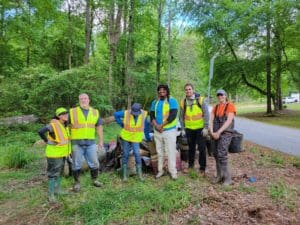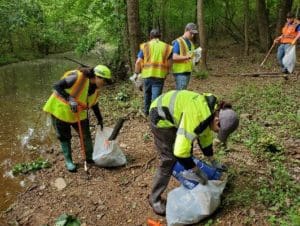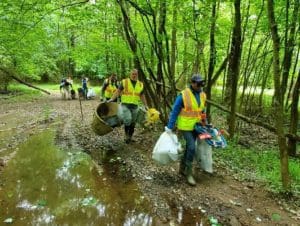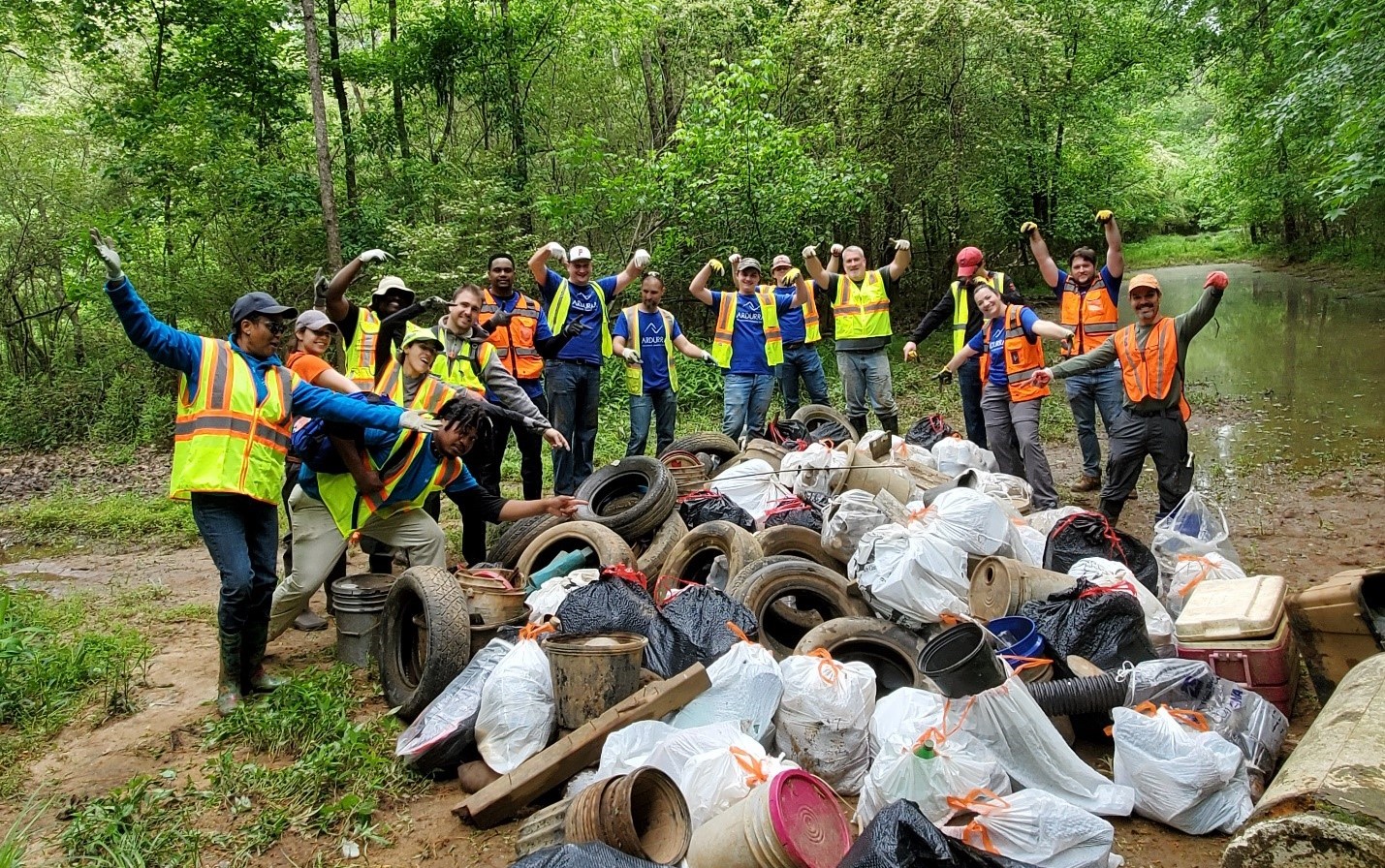This is what is sitting in our wetlands! Beautiful green space for us to cherish. The lush greenery helps to clean the air, gives natural purifiers for our water, and provides a natural habitat for many species of amphibians, reptiles, birds, and mammals which are essential to our ecosystem. But this is what lives there.
 Last month, I joined a team of my colleagues from Atlas along with other volunteers in a clean-up effort for the Great Gwinnett Wetlands. We cleaned up trash from the floodplain and wetlands bordering a section of Sweetwater Creek. There were times that I had to pause to just look at and touch the variety of plants growing, the water lilies that thrive and the colors that are so vibrant and alive there. It was simply breathtaking beauty.
Last month, I joined a team of my colleagues from Atlas along with other volunteers in a clean-up effort for the Great Gwinnett Wetlands. We cleaned up trash from the floodplain and wetlands bordering a section of Sweetwater Creek. There were times that I had to pause to just look at and touch the variety of plants growing, the water lilies that thrive and the colors that are so vibrant and alive there. It was simply breathtaking beauty.
Our work area was located on the right bank of Sweetwater Creek on the property of Bethesda Park, but cut-off from the Park by the creek itself. The area has a sewer easement running through it, which provided excellent access to the wetlands, and is surrounded by residential development. In just three hours, a crew of 17 volunteers cleaned approximately eight acres of wetlands along a 2,300ft. section of the creek. In the end, an estimated 1,800 pounds of trash were collected in 94 bags, 15 tires, a mattress, and water heater, and a bicycle.
 As I walked along picking up garbage, there were two things that struck me. How does all this trash end up in these wetlands? Second, there are so many simple things that can be done to keep these life-giving spaces safe, healthy and beautiful for generations to come.
As I walked along picking up garbage, there were two things that struck me. How does all this trash end up in these wetlands? Second, there are so many simple things that can be done to keep these life-giving spaces safe, healthy and beautiful for generations to come.
To answer the first question – trash thrown in parking lots, roadways, ball fields, restaurants, on the streets gets swept up with floodwaters and back into rivers and creeks, and then into these wetland areas. Wetlands across the US provide many important services to the environment and to the public. They offer critical habitats for fish, waterfowl, and other wildlife; they purify polluted waters; and they help check the destructive power of floods and storms. Wetlands act as natural water purifiers, filtering sediment and absorbing many pollutants in surface waters. In some wetland systems, this cleansing function also enhances the quality of groundwater supplies. I am fascinated by the fact that wetlands present along rivers and streams absorb energy and store water during storms, which reduces downstream flood damage and lessens the risk of flash floods. The slow release of this stored water over time can help keep streams flowing during periods of drought. As a foodie, I love that wetlands provide food, cover, spawning, and nursery grounds for freshwater and marine life including trout, striped bass, pike, sunfish, crappie, crab, and shrimp. And, they are particularly vital to many migratory bird species. Nearly 7000 plant species live in U.S. wetlands, many of which can only survive in these wet environments.*
Wetlands are a productive and valuable resource that is worthy of protection and restoration. But all this beauty and value to our environment is at risk – simply because we are careless about how we dispose of our trash. And talk about TRASH! There were mattresses, a water heater, tires, children’s toys, soccer balls, and tennis balls! But the overwhelming item discarded in this wetland area was plastic bottles.
 Just google plastic bottles and the impact on the environment, and you can spend hours reading about the ravaging effects that it has on the ocean, marine life, wetlands, the ecosystem, and it goes on and on. I am not an environmental scientist, nor do I claim to be an expert on the impact of BPA or plastic on our bodies, but what I saw and picked up was enough for me to make a change.
Just google plastic bottles and the impact on the environment, and you can spend hours reading about the ravaging effects that it has on the ocean, marine life, wetlands, the ecosystem, and it goes on and on. I am not an environmental scientist, nor do I claim to be an expert on the impact of BPA or plastic on our bodies, but what I saw and picked up was enough for me to make a change.
Driving home from that cleanup effort, my overriding thought was, I HAVE TO DO BETTER! Here’s what I plan to do moving forward.
First, I must apologize to my daughter who has consistently encouraged me to stop buying plastic water bottles at home. I have stopped! And here are some other simple things that I am doing:
- Carry an eco-friendly reusable water bottle
- Reduce my use of plastics, and if I can’t, then reuse and recycle all plastic
- Use the water filter at home—I already have one in my refrigerator
- Working with my office to implement a water purifying system
- Carry reusable grocery bags to the store
- Skip the straw and lid at the restaurant
- Get educated, volunteer, and contribute in any other way that I can.
And I hope you will consider doing just one, or however many more meaningful steps you can take to protect our wetlands…our environment.
As we were cleaning up, John Butler, Gwinnett County’s Water Resources Outreach Manager, mentioned that this type of event is not just about getting all the trash from the Wetland area. A trash cleanup helps, but it is only a short-term solution. This effort is about raising the awareness of the volunteers so they can talk about it to someone else, and hopefully influence change.
I am certainly more aware, and I will work to make a change. I hope you will too.
Author:
Karlene Baron | Director of Communications | Atlas
